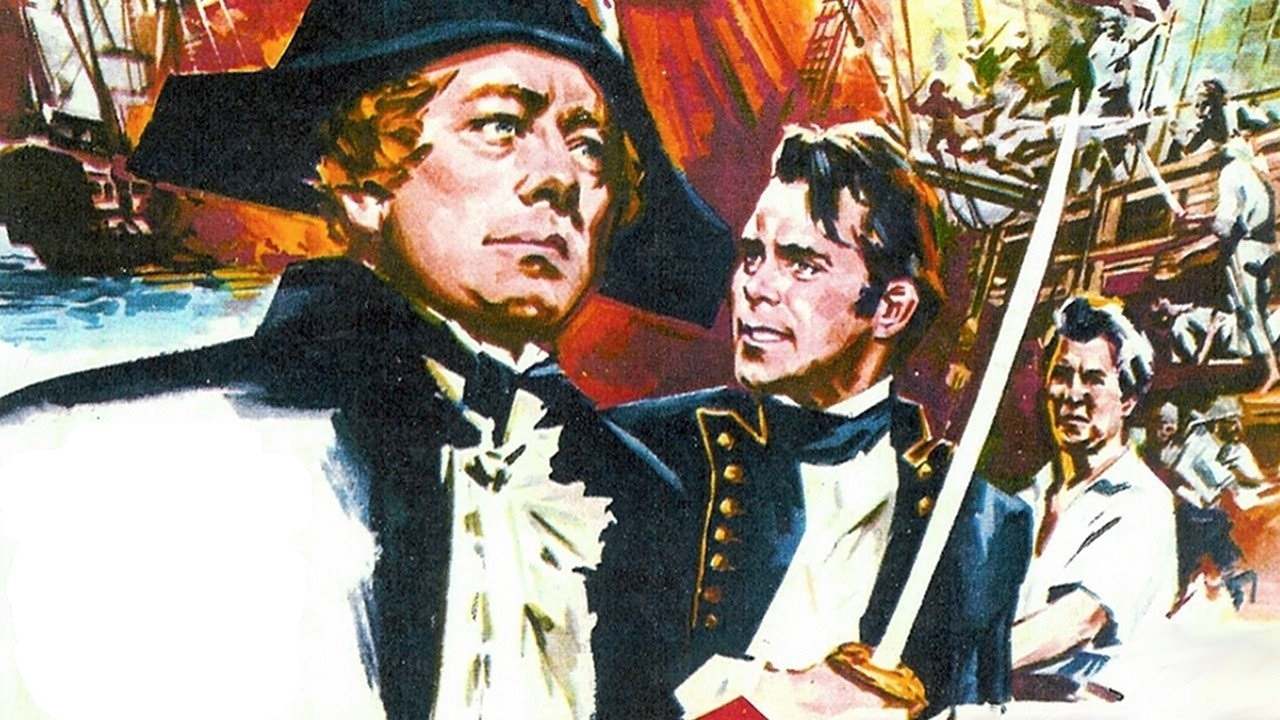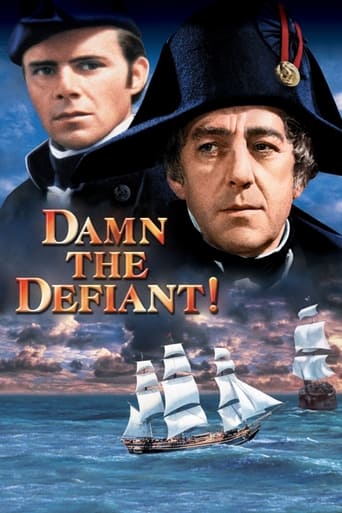

DAMN THE DEFIANT!I was not expecting to like this, but I did. I thought it was really good.The movie is about a British ship on it's way to meet a convoy, but on the way runs into a couple of French ships. What doesn't help is there is mutiny on the Defiant.The movie stars Alec Guinness, Dirk Bogarde & Anthony Quale. Everyone was brilliant... there was not much bad acting. Everyone was convincing and I felt for some of the characters. My favourite character was played by Alec. He seemed to be such a good captain, but he runs into trouble when his second in command decides to take his position.The story was average, but the cast and the action made the movie very good. There was some great fighting scenes between ships and even fighting scenes on the ships between people. The film was very subtle too. There were people being punished etc, but you didn't see anything which made this film family friendly.I will give this film a 7 out of 10.Another Alec classic... I am really growing into quite a fan.For more reviews, please like my Facebook page:https://www.facebook.com/pages/Ordinary-Person-Movie- Reviews/456572047728204?ref=hl
... View MoreI see that mine is the fourth review within a month of this 1962 movie it's as if the film were just released! This is absolutely first rate gripping drama - wonderfully acted by three of England's best, with beautiful production values and a fascinating and varied tale. It is really three tales in one: of naval warfare during the Napoleonic Wars (three wonderfully created battles), of mutiny, and of the conflict between a captain and his first lieutenant. The folding of these three stories is really superbly done - and the characterization is superb - we feel very strongly that we know these very interesting people - and the acting by the three stars: Alec Guinness, Dirk Bogarde and Anthony Quayle is excellent. I take issue with one comment by a poster who wrote that Guinnesss plays a weak character - I don't agree though we are shown the strategic and tactical genius of his first lieutenant with whom he is in conflict. This is British film-making at its best. At least as fine as Master and Commander. I can't imagine anyone who would dislike it - anyone.
... View MoreI remember seeing H.M.S. Defiant in the theater when it came out back in 1962. It's too bad my VHS copy is formatted. One really needs the wide screen to appreciate the vast sweep of this wonderful sea adventure.The Defiant sets sail from the naval harbor at Spithead just before the ships of the Channel Fleet are ready to start an organized mutiny. So with no contact between them and the ships at Spithead or in the Mediterranean, the men of the Defiant have to work out their own course of action. That action is the basis for what happens.They've got an unwitting ally in the ship's executive officer, Scott- Padget played by Dirk Bogarde. A future Drake or Hawkins with influence and a taste for sadism. He looks to usurp the authority of Captain Crawford who is played by Alec Guinness. The conflict between them plays into the hands of the mutineers.In that other famous story of the sea, Mutiny on the Bounty, Fletcher Christian points out to Captain Bligh that the men drafted into the Royal Navy from the press gangs aren't king and country volunteers. Neither are these people in the foc'sle of the Defiant.Bogarde plays against type and does it well. He's usually not a villain in film although he had essayed villainous roles before in his career. But Guinness is a wonder. His Captain Crawford, calm, detached, and inspiring in his own way in his patriotism was a role Alec Guinness could be proud of. Totally different than the characters he played in those Ealing studio comedies. This falls more in line with Colonel Nicholson in The Bridge on the River Kwai or Colonel Sinclair in Tunes of Glory without the bad character features the other two had. Great Britain eventually stopped using press gangs, but at the time it was the way the Royal Navy got a crew together. In fact later on during the Napoleonic Wars, the British took to stopping American ships and impressing members of those crews in the Royal Navy. It was one of the causes of the War of 1812.Two other performances in H.M.S. Defiant are worthy of note. Anthony Quayle as the mutiny leader on the Defiant and Tom Bell one of the mutineers whose rashness nearly blows it all for the seamen and their cause.Hovering over all of this is the French and to me the highlight of the film is Alec Guinness reminding the men of their duty to prevent a French invasion of their island home. It's a superb piece of drama.A little Mutiny on the Bounty, a little Horatio Hornblower go into the plot of H.M.S. Defiant. It's a good mix with a superb group of players serving it up for the audience.
... View MoreIn April 1789 Captain William Bligh was set adrift off the Friendly Islands by Fletcher Christian and the crew of H.M.S. Bounty, tired of Bligh's bad temper and harsh tongue. Bligh and the loyal crew members (except two killed by cannibals on one island they stopped at) managed to sail the open boat 2,100 miles despite lack of supplies and dangerous seas and weather to safety. Bligh returned to England, and eventually made a second trip to Tahiti to complete his original mission. Christian and most of the Bounty mutineers fled on the Bounty and reached Pitcairn Island, where their descendants live to this day. The mutiny on the Bounty is the one that most people think of whenever they hear the word "mutiny". Otherwise they think of THE CAINE MUTINY. Actually there have been many mutinies. In 1905 a mutiny on the Russian battleship Potemkin occurred at Odessa on the Black Sea. It was immortalized by Serge Eisenstein in his film of the name POTEMKIN. It surprises many people outside of England that the Bounty was peanuts compared to the Great Mutiny of 1797 at the Nore and Spithead of the entire British fleet (also the 1931 Invergordon Mutiny of the British fleet during the depression, which was a total surprise). The Great Mutiny is supreme because it occurred just when England was facing revolutionary France in the French Revolutionary Wars. A force being planned by Wolfe Tone and the French General Lazare Hoche was to invade Ireland. By sheer chance the French were unable to take advantage of the moment of England's peril to invade.The 1797 Mutiny at Spithead was actually successful - various gains in pay and food were made by the sailors. Then came the Nore Mutiny, which was led by a seaman of some leadership qualities named Richard Parker. Parker's demands were impossible, and he apparently toyed with leading the fleet to France. Instead the British Admiralty got tough, and crushed the mutiny. Ironically one of the last ships to give up was H.M.S. Director, which was commanded by William Bligh. It was the second mutiny (of three!) that Bligh would face in his career. Parker was tried for mutiny and executed, as were dozens of other sailors.It would be nice if some enterprising producer would make an accurate film of the 1797 Mutiny - but until that day comes we are left with two films that roughly approximate the story. There is Peter Ustinov's BILLY BUDD, which is set in the period of the Great Mutiny, and this one. BILLY BUDD has much going for it regarding it's source material (Herman Melville's brilliant study of good and evil, and how they are impossible to separate). Then there is DAMN THE DEFIANT / H.M.S. DEFIANT, which tells the story from the point of view of a single vessel and the evils that permeated all the crew from the Captain to the tars. Alec Guinness is a well meaning but weak leader who is the Captain of Defiant, and has been stuck with Dirk Bogarde as his new second in command, a socially well-connected sadist. Bogarde is determined to be the real commander of the ship, and is willing to do what is needed to bring Guinness and everyone in sight under heal. Guinness's son is a midshipman on the DEFIANT, and Bogarde keeps finding ways of punishing the young man that Guinness (because of fears of favoritism) will not interfere with. On top of this, during one battle, Guinness loses an arm (a salute to Lord Nelson who was similarly was crippled).However, the men led by Anthony Quayle, decide to join the mutiny. And then it is Bogarde's turn to sweat.What were the gripes of the mutineers? Low pay (the government spent money on bribes for votes, but not decent pay). Nothing like pensions for the men - frequently kidnapped by press gangs in the major cities - and left cripples after serving in the naval battles. Food was crap - the quartermasters and the people who sold supplies were in cahoots and sold rotten food to the ships. It was a "lovely life". The wonder is that there weren't more bloodbath mutinies. One (in 1798) on board H.M.S. Hermoine led to the murder of a dozen officers, including the Captain (one Hugh Pigott). Reading of it makes one realize how lucky Bligh and the Admirals were that they did not face the real wrath that was just under the surface.
... View More